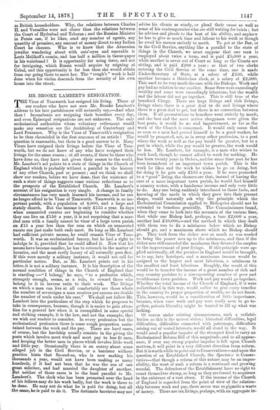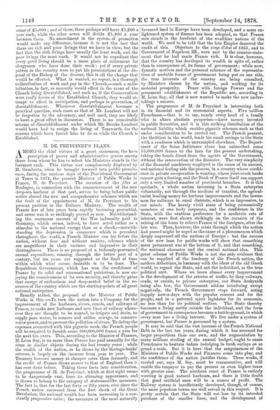MR. BROOK FI LAMBERT'S RESIGNATION. T TEP, Vicar of Tamworth has
resigned his living. Those of our readers who have not seen Mr. Brooke Lambert's address to his late parishioners will naturally say,—And what then ? Incumbents are resigning their benefices every day, and even Episcopal resignations are not unknown. The only ecclesiastical authorities whose voluntary retirement would make any sensation are the Archbishop of Canterbury and Lord Penzance. Why is the Vicar of Tamworth's resignation to be thus chronicled in the first sentence of an article ? The question is reasonable, but there is a good answer to it. Many Vicars have resigned their livings before the Vicar of Tam- worth, but we do not know of any who have resigned their livings for the same reason ; at all events, if there be those who have done so, they have not given their reason to the world. Mr. Lambert's act points to a state of things in the Church of England which is probably without a parallel in the history of any other Church, past or present ; and we think we shall show our readers, before we have done, that the existence of such a state of things suggests some curious reflections as to the prospects of the Established Church. Mr. Lambert's account of his resignation is very simple. A change in family circumstanoes has very much lessened his income, and he can no longer afford to be Vicar of Tamworth. Tamworth is an im- portant parish, with a population of 8,000, and a large and stately church. But the income is only £135 a year. In days when unmarried curates are beginning to consider whether they can live on £150 a year, it is not surprising that a mar- ried man with a family cannot be vicar of a large town parish on £15 a year less than the sum on which an unmarried curate can just make both ends meet. So long as Mr. Lambert had sufficient private means, he could remain Vicar of Tam- worth. It was an ecclesiastical luxury, but he had a right to indulge in it, provided that he could afford it. Now that his means have become smaller, he has to retrench in the matter of luxuries, and the most costly luxury of all naturally goes first. If this were merely a solitary instance, it would not call for particular notice. But, as Mr. Lambert points out in his letter, it is not a solitary instance. It is his description of the normal condition of things in the Church of England that is startling :—" I belong," he says, "to a profession which, strangely enough, seems, as a rule, to reward those who belong to it in inverse ratio to their work. The livings on which a man can live at all comfortably are those where the number of sovereigns a man receives per annum are double the number of souls under his care." We shall not follow Mr. Lambert into the particulars of the step which he proposes to take in consequence, because, though it is easier to gain atten- tion for a general law when it is exemplified in some special and striking example, it is the law and not the example, that we wish our readers to consider. In every profession but the ecclesiastical profession there is some rough proportion main- tained between the work and the pay. There are hard cases, of course, but the hardship usually consists in the giving the posts which involve most work and most pay to less fit men, and keeping the better men in places which involve little work and little pay. Occasionally there is an outcry about some alleged job in the Civil Service, or a barrister without practice hints that So-and-so, who is now making his thousands a year, would not have been making as many hundreds, if it had not been that he was the son of one great solicitor, and had married the daughter of another. But neither of these cases is in the least parallel to Mr. Lambert's. The clerk who has been promoted over the head of his fellows may do his work badly, but the work is there to be done. He may not do what he is paid for doing, but all the same, be is paid to do it. The fortunate barrister may not advise his clients as wisely, or plead their cause so well as some of his contemporaries who are still waiting for briefs ; but he advises and pleads to the best of his ability, and anyhow he has to give as much time and labour to his work as though he owed his success entirely to merit. To get at the Bar, or in the Civil Service, anything like a parallel to the state of things in the Church, we must suppose that one man is employed about twice a term, and is paid £5,000 a year, while another is never out of Court so long as the Courts are sitting, and is paid £200 a year ; or that of two clerks entering the Civil Service at the same time, one is made Under-Secretary of State, at a salary of £150, while another becomes a third-class clerk, at a salary of £2,000. This used to be very much the case with the Bishops. Work and pay had no relation to one another. Some Sees were exceedingly wealthy and some were exceedingly laborious, but the wealth and the labour did not go together. This is still true of the beneficed Clergy. There are large livings and rich livings, livings where there is a great deal to do and livings where there is a great deal to get, but there is no connection between them. If all presentations to benefices went strictly by merit, and the best and the most active clergymen were given the best posts, it would be no real improvement, as far as the work of the Church is concerned. It would only mean that as soon as a man had proved himself to be a good worker, he would be promoted, not, as in every other profession, to a post where the work as well as the pay would be greater, but to a post in which, while the pay would be greater, the work would be less. Mr. Lambert, for example, is a man who wishes to work hard, though he cannot afford to work for nothing. He has been twenty years in Orders, and for some time past he has been incumbent of an important town parish. This is the work he likes and the work he wishes to go on doing, but for doing it he gets only £135 a year. If he were promoted to a "good" living, the chances are that, instead of having the care of a more important town parish, he would find himself a country rector, with a handsome income and only very little to do. Any one being suddenly introduced to these facts, and knowing of the mode in which they grew into their present shape, would naturally ask why the principle which the Ecclesiastical Commission applied to Bishoprics should not be extended to benefices generally. The Commissioners found, when they came to look into the accounts of the various Sees, that while one Bishop had, perhaps, a bare £2,000 a year, another had £40,000,—and the method in which they dealt with them was to fix a minimum below which no Bishop should go, and a maximum above which no Bishop should go. They took from the richer sees as much as was needed to bring the poorer sees up to the minimum, and then if the richer sees still exceeded the maximum they devoted the surplus to the improvement of poor livings. If this principle were ap- plied universally, all the parishes in England would be brought, so to say, into hotchpot, and a maximum income would be assigned to the largest and most laborious, a minimum to the smallest and least laborious. Roughly, the result of this would be to transfer the income of a great number of rich and easy country parishes to a corresponding number of poor and troublesome town parishes. Work and pay would go together.
Whether the total income of the Church of England, if it were redistributed in this way, would suffice to give every benefice in the country its proper proportion of wealth, we do not know. This, however, would be a consideration of little importance, because, when once work and pay were really seen to go to- gether, private liberality might be trusted to fill up what was lacking. Of course under existing circumstances, such a redistri- bution as this is the merest vision ; historical difficulties, legal difficulties, difficulties connected with patronage, difficulties arising out of vested interests, would all stand in the way. It would need a popular impulse of the strongest kind to carry an Ecclesiastical Reform Bill of this magnitude, and to all appear- ance, if ever any strong popular impulse is felt upon Church matters, it will point in a very different direction from reform. But it is worth while to point out to Conservatives—and upon the question of an Established Church, the Spectator is Conser- vative—that though a reform of this nature may be an impos- sibility, the want of such a reform is a continual and growing scandal. The defenders of the Establishment have no right to count themselves strong, so long as they are forced to acquiesce in the existence of a vast abuse. If the income of the Church of England is regarded from the point of view of the relation- ship between work and pay, there never was so gigantic a waste of money. There are ten livings, perhaps, with an aggregate in- come of £5,000; and of these, three perhaps will have £1,200 a year each, while the other seven will divide £1,400 a year between them. No amendment in the system of promotion would make any difference, because it is not the fact that there are rich and poor livings that we have in view, but the fact that the rich livings have usually the least work, and the poor livings the most work. It would not be expedient that every good living should be a mere place of retirement for clergymen who have done their work ; yet if every private patron in the country were to put his presentations at the dis- posal of the Bishop of the diocese, this is all the change that would be effected. What is wanted, we repeat, is a thorough redistribution of work and pay in the Church,—such a redis- tribution in fact, as necessity would effect in the event of the Church being disestablished, and such as, if the Conservatives were really lovers of the Established Church, they would at- tempt to effect in anticipation, and perhaps in prevention, of disestablishment. Whenever disestablishment becomes a practical question, such cases as that of Mr. Lambert will not be forgotten by the adversary, and well used, they are likely to have a great effect in discussion. There is no conceivable scheme of disestablishment under which Mr. Brooke Lambert would have had to resign the living of Tamworth, for the reasons which have forced him to do so while the Church is Established.































 Previous page
Previous page